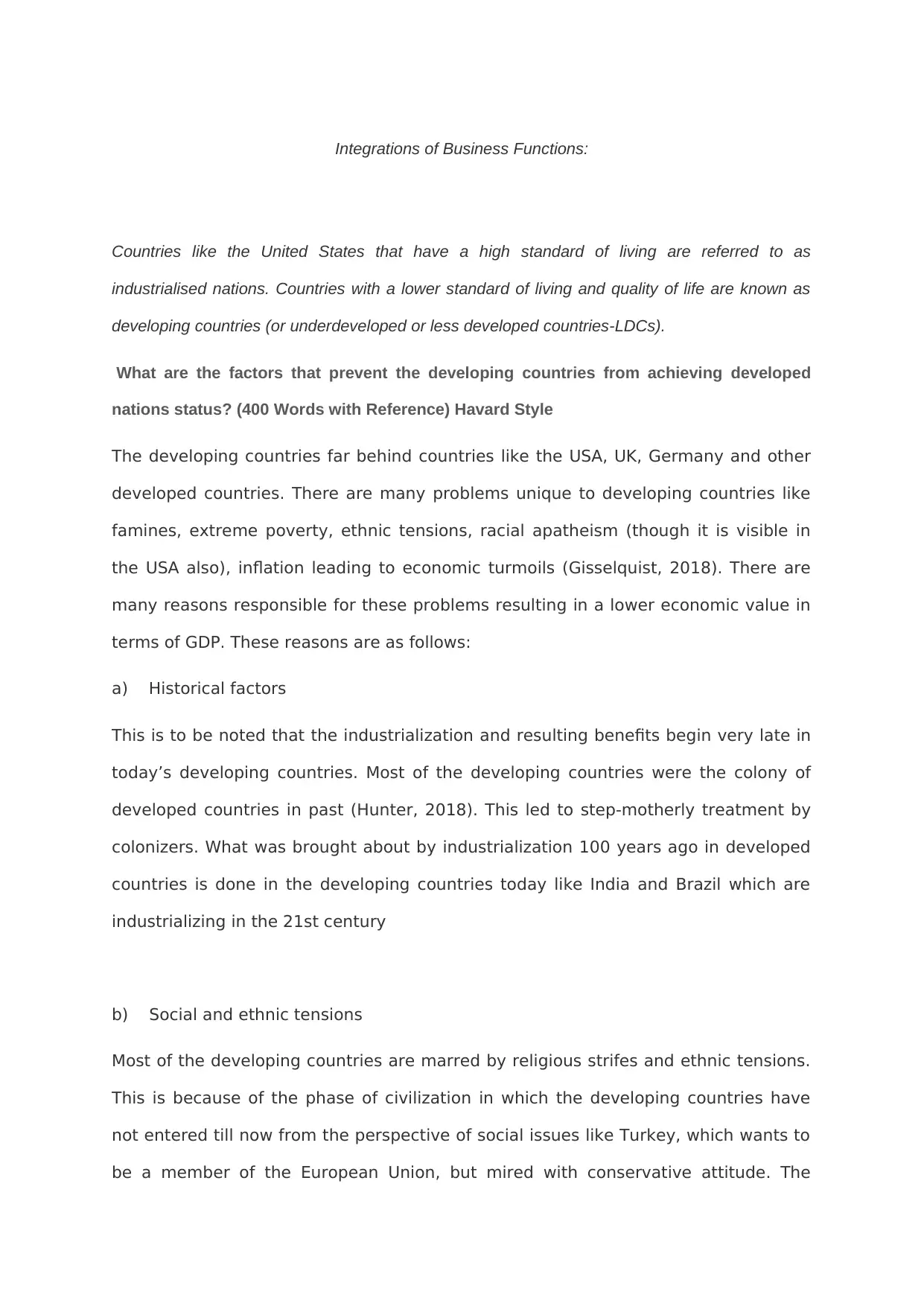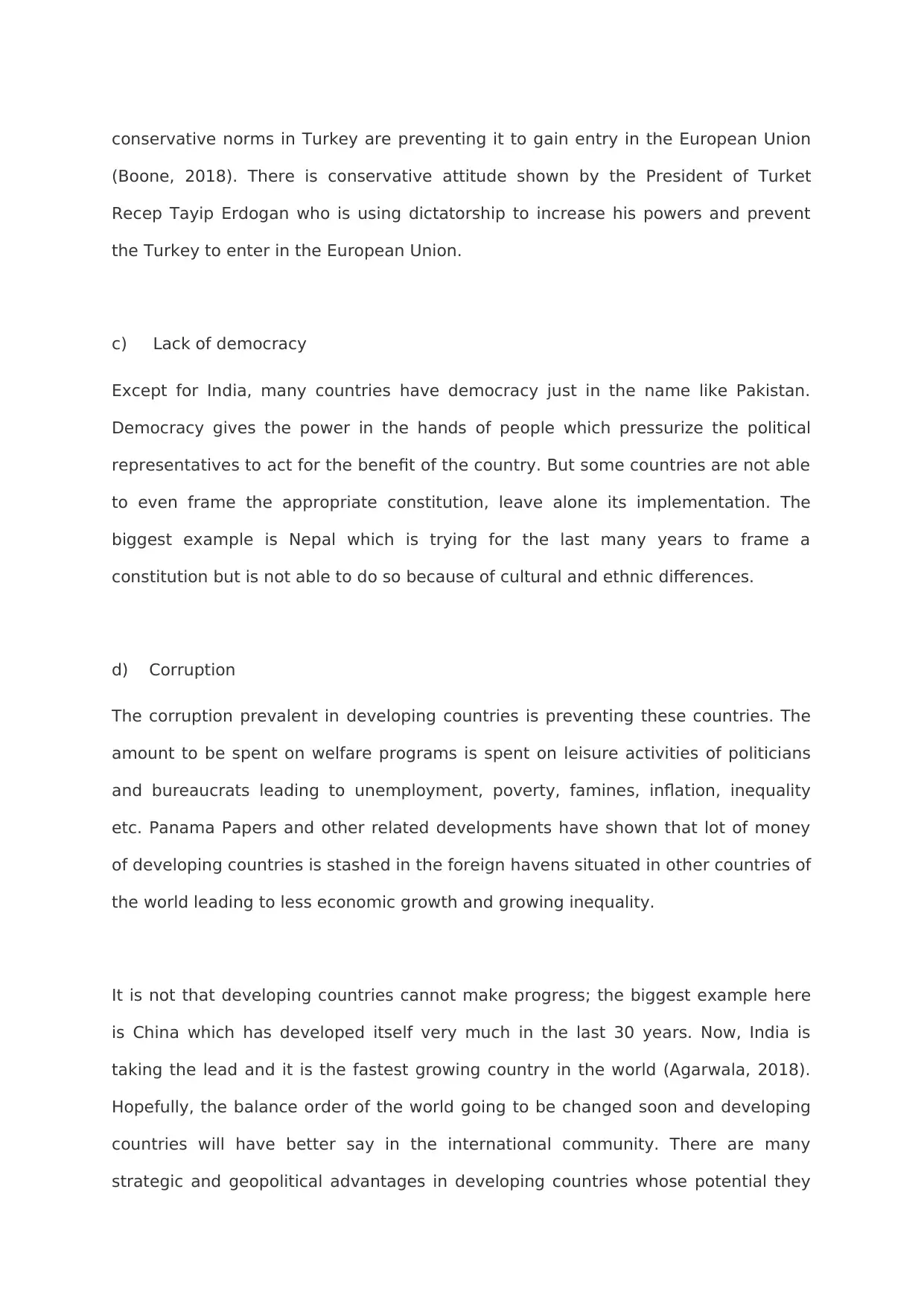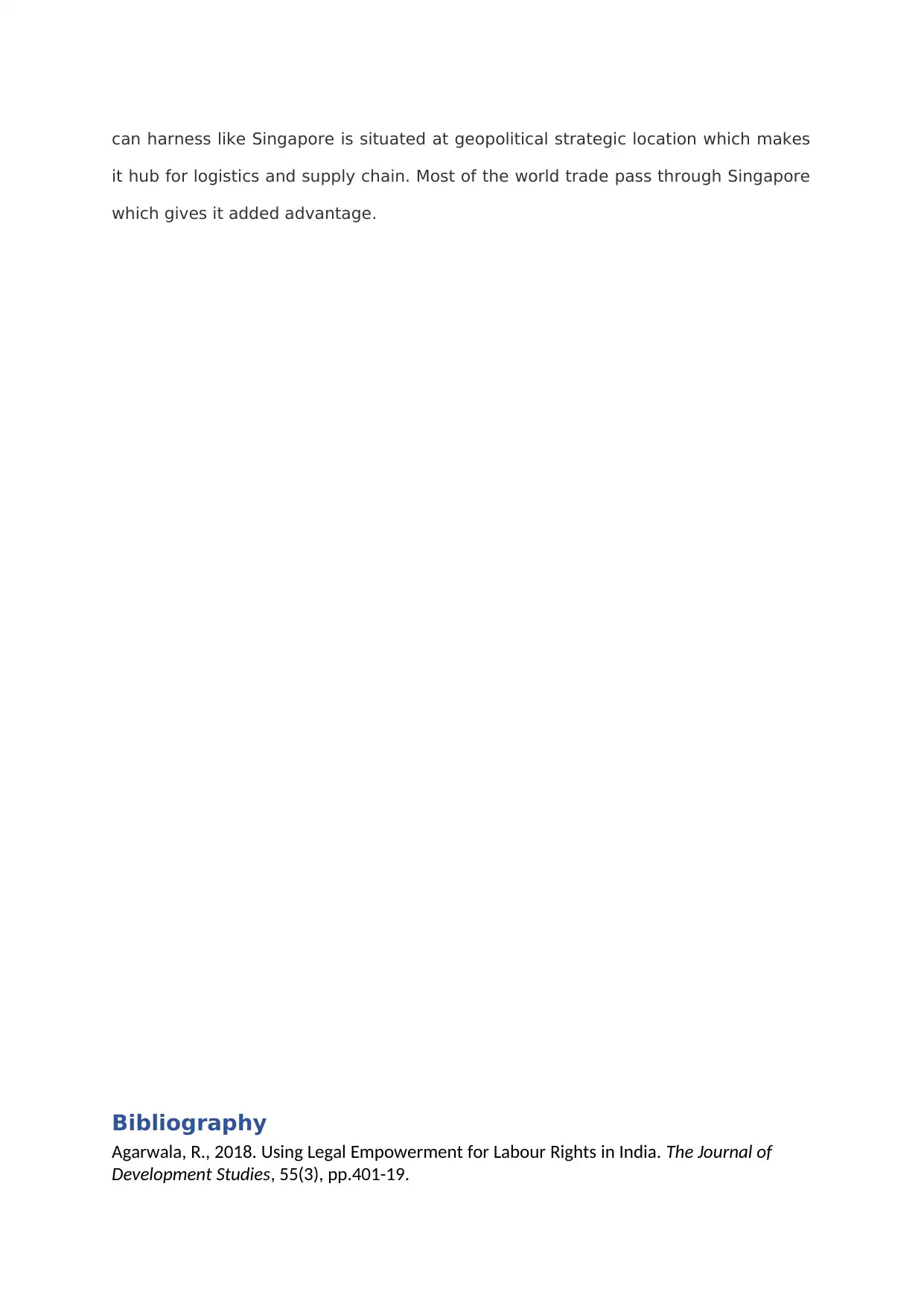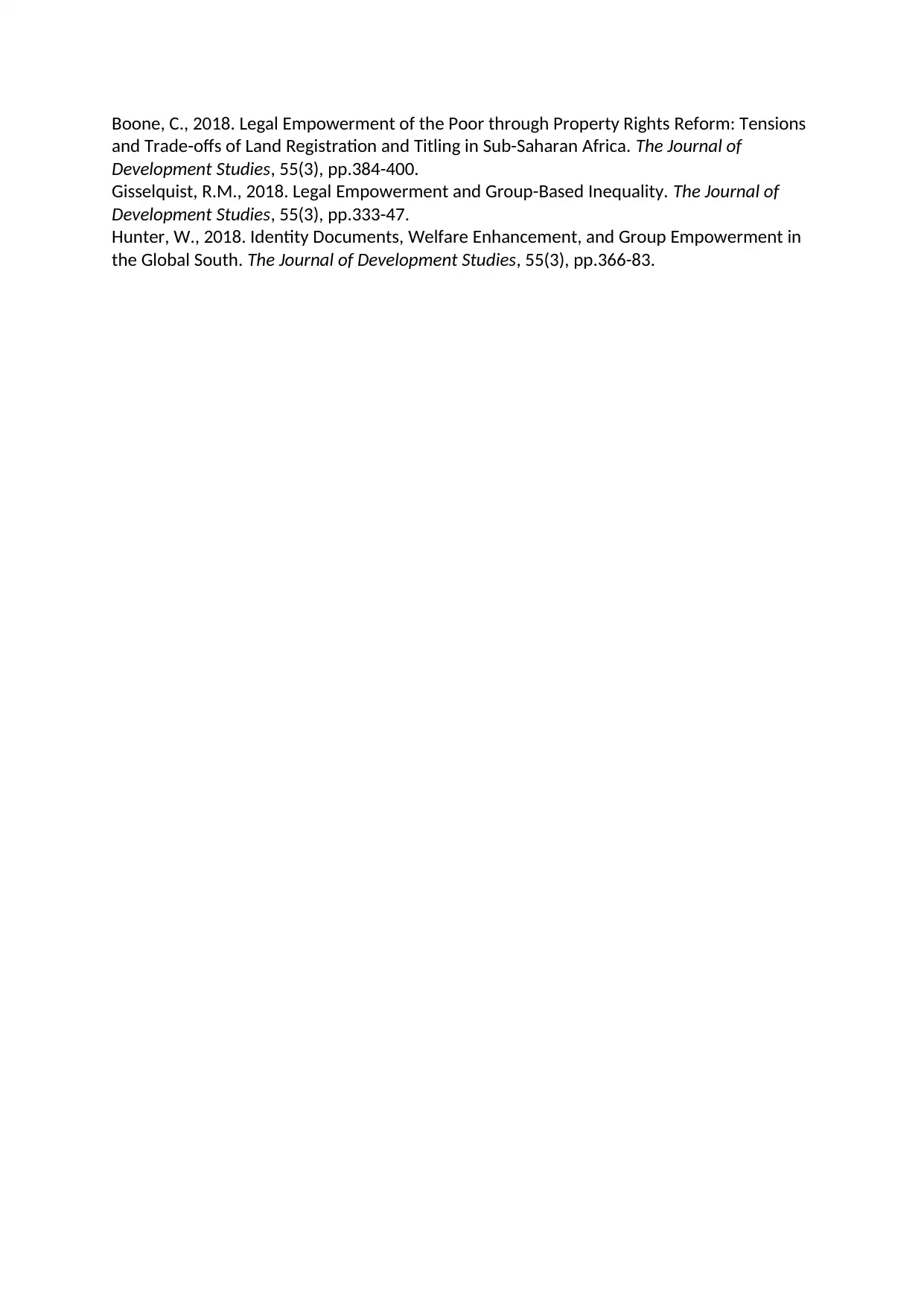Factors Preventing Developing Countries from Achieving Developed Nations Status
VerifiedAdded on 2023/05/27
|4
|780
|252
AI Summary
This article discusses the factors that prevent developing countries from achieving developed nations status. It covers historical factors, social and ethnic tensions, lack of democracy, and corruption. The article also highlights the progress made by countries like China and India and the potential of developing countries to harness their strategic and geopolitical advantages.
Contribute Materials
Your contribution can guide someone’s learning journey. Share your
documents today.

Integrations of Business Functions:
Countries like the United States that have a high standard of living are referred to as
industrialised nations. Countries with a lower standard of living and quality of life are known as
developing countries (or underdeveloped or less developed countries-LDCs).
What are the factors that prevent the developing countries from achieving developed
nations status? (400 Words with Reference) Havard Style
The developing countries far behind countries like the USA, UK, Germany and other
developed countries. There are many problems unique to developing countries like
famines, extreme poverty, ethnic tensions, racial apatheism (though it is visible in
the USA also), inflation leading to economic turmoils (Gisselquist, 2018). There are
many reasons responsible for these problems resulting in a lower economic value in
terms of GDP. These reasons are as follows:
a) Historical factors
This is to be noted that the industrialization and resulting benefits begin very late in
today’s developing countries. Most of the developing countries were the colony of
developed countries in past (Hunter, 2018). This led to step-motherly treatment by
colonizers. What was brought about by industrialization 100 years ago in developed
countries is done in the developing countries today like India and Brazil which are
industrializing in the 21st century
b) Social and ethnic tensions
Most of the developing countries are marred by religious strifes and ethnic tensions.
This is because of the phase of civilization in which the developing countries have
not entered till now from the perspective of social issues like Turkey, which wants to
be a member of the European Union, but mired with conservative attitude. The
Countries like the United States that have a high standard of living are referred to as
industrialised nations. Countries with a lower standard of living and quality of life are known as
developing countries (or underdeveloped or less developed countries-LDCs).
What are the factors that prevent the developing countries from achieving developed
nations status? (400 Words with Reference) Havard Style
The developing countries far behind countries like the USA, UK, Germany and other
developed countries. There are many problems unique to developing countries like
famines, extreme poverty, ethnic tensions, racial apatheism (though it is visible in
the USA also), inflation leading to economic turmoils (Gisselquist, 2018). There are
many reasons responsible for these problems resulting in a lower economic value in
terms of GDP. These reasons are as follows:
a) Historical factors
This is to be noted that the industrialization and resulting benefits begin very late in
today’s developing countries. Most of the developing countries were the colony of
developed countries in past (Hunter, 2018). This led to step-motherly treatment by
colonizers. What was brought about by industrialization 100 years ago in developed
countries is done in the developing countries today like India and Brazil which are
industrializing in the 21st century
b) Social and ethnic tensions
Most of the developing countries are marred by religious strifes and ethnic tensions.
This is because of the phase of civilization in which the developing countries have
not entered till now from the perspective of social issues like Turkey, which wants to
be a member of the European Union, but mired with conservative attitude. The
Secure Best Marks with AI Grader
Need help grading? Try our AI Grader for instant feedback on your assignments.

conservative norms in Turkey are preventing it to gain entry in the European Union
(Boone, 2018). There is conservative attitude shown by the President of Turket
Recep Tayip Erdogan who is using dictatorship to increase his powers and prevent
the Turkey to enter in the European Union.
c) Lack of democracy
Except for India, many countries have democracy just in the name like Pakistan.
Democracy gives the power in the hands of people which pressurize the political
representatives to act for the benefit of the country. But some countries are not able
to even frame the appropriate constitution, leave alone its implementation. The
biggest example is Nepal which is trying for the last many years to frame a
constitution but is not able to do so because of cultural and ethnic differences.
d) Corruption
The corruption prevalent in developing countries is preventing these countries. The
amount to be spent on welfare programs is spent on leisure activities of politicians
and bureaucrats leading to unemployment, poverty, famines, inflation, inequality
etc. Panama Papers and other related developments have shown that lot of money
of developing countries is stashed in the foreign havens situated in other countries of
the world leading to less economic growth and growing inequality.
It is not that developing countries cannot make progress; the biggest example here
is China which has developed itself very much in the last 30 years. Now, India is
taking the lead and it is the fastest growing country in the world (Agarwala, 2018).
Hopefully, the balance order of the world going to be changed soon and developing
countries will have better say in the international community. There are many
strategic and geopolitical advantages in developing countries whose potential they
(Boone, 2018). There is conservative attitude shown by the President of Turket
Recep Tayip Erdogan who is using dictatorship to increase his powers and prevent
the Turkey to enter in the European Union.
c) Lack of democracy
Except for India, many countries have democracy just in the name like Pakistan.
Democracy gives the power in the hands of people which pressurize the political
representatives to act for the benefit of the country. But some countries are not able
to even frame the appropriate constitution, leave alone its implementation. The
biggest example is Nepal which is trying for the last many years to frame a
constitution but is not able to do so because of cultural and ethnic differences.
d) Corruption
The corruption prevalent in developing countries is preventing these countries. The
amount to be spent on welfare programs is spent on leisure activities of politicians
and bureaucrats leading to unemployment, poverty, famines, inflation, inequality
etc. Panama Papers and other related developments have shown that lot of money
of developing countries is stashed in the foreign havens situated in other countries of
the world leading to less economic growth and growing inequality.
It is not that developing countries cannot make progress; the biggest example here
is China which has developed itself very much in the last 30 years. Now, India is
taking the lead and it is the fastest growing country in the world (Agarwala, 2018).
Hopefully, the balance order of the world going to be changed soon and developing
countries will have better say in the international community. There are many
strategic and geopolitical advantages in developing countries whose potential they

can harness like Singapore is situated at geopolitical strategic location which makes
it hub for logistics and supply chain. Most of the world trade pass through Singapore
which gives it added advantage.
Bibliography
Agarwala, R., 2018. Using Legal Empowerment for Labour Rights in India. The Journal of
Development Studies, 55(3), pp.401-19.
it hub for logistics and supply chain. Most of the world trade pass through Singapore
which gives it added advantage.
Bibliography
Agarwala, R., 2018. Using Legal Empowerment for Labour Rights in India. The Journal of
Development Studies, 55(3), pp.401-19.

Boone, C., 2018. Legal Empowerment of the Poor through Property Rights Reform: Tensions
and Trade-offs of Land Registration and Titling in Sub-Saharan Africa. The Journal of
Development Studies, 55(3), pp.384-400.
Gisselquist, R.M., 2018. Legal Empowerment and Group-Based Inequality. The Journal of
Development Studies, 55(3), pp.333-47.
Hunter, W., 2018. Identity Documents, Welfare Enhancement, and Group Empowerment in
the Global South. The Journal of Development Studies, 55(3), pp.366-83.
and Trade-offs of Land Registration and Titling in Sub-Saharan Africa. The Journal of
Development Studies, 55(3), pp.384-400.
Gisselquist, R.M., 2018. Legal Empowerment and Group-Based Inequality. The Journal of
Development Studies, 55(3), pp.333-47.
Hunter, W., 2018. Identity Documents, Welfare Enhancement, and Group Empowerment in
the Global South. The Journal of Development Studies, 55(3), pp.366-83.
1 out of 4
Your All-in-One AI-Powered Toolkit for Academic Success.
+13062052269
info@desklib.com
Available 24*7 on WhatsApp / Email
![[object Object]](/_next/static/media/star-bottom.7253800d.svg)
Unlock your academic potential
© 2024 | Zucol Services PVT LTD | All rights reserved.